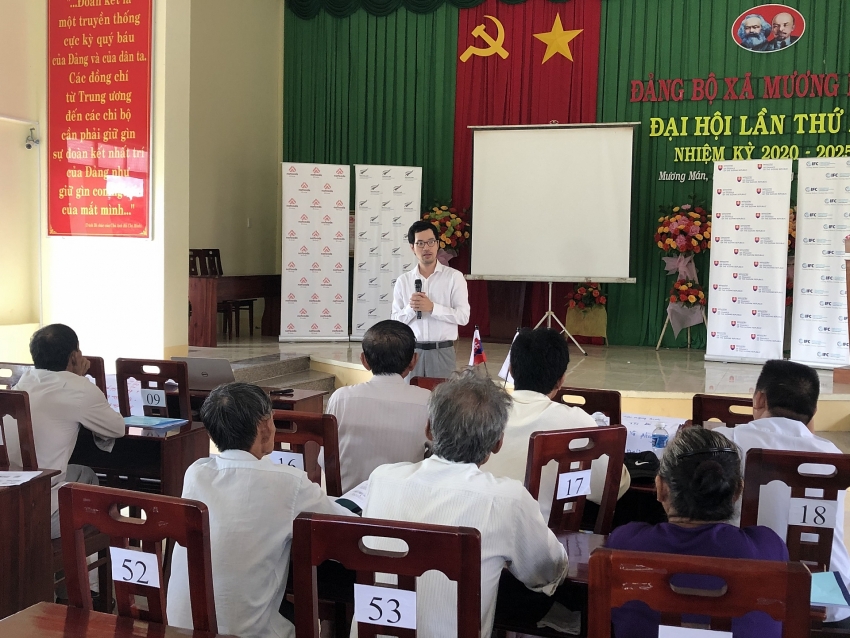Binh Thuan pushes up sustainable farming of dragon fruit
 |
| A training session on GLOBALG.A.P standards for farmers in Binh Thuan, supported by Nafoods in co-operation with IFC |
Along with improving dragon fruit farming, the province is promoting communications activities for local people on the role and importance of VietGAP-based dragon fruit farming and systematic organisation of production steps, from farming, packing, and preliminary processing to storage for export purposes. At the same time, more dragon fruit will be grown under GLOBALG.A.P standards to expand and diversify destination markets such as Japan, Korea, and Europe.
Signing co-operation agreements with leading agricultural enterprises, such as Nafoods Group JSC, for output market stability is also a sound approach taken by Binh Thuan province.
Under an MoU on investment co-operation between Chairman of Binh Thuan People's Committee Nguyen Ngoc Hai and chairman of the Board of Management of Nafoods Group JSC Nguyen Manh Hung signed in March 2019, the two sides agreed to jointly establish and develop organic dragon fruit farms in the province with a minimum of 10,000 hectares per farm.
In the framework of this co-operation on the establishment of organic dragon fruit farms in line with global standards, Nafoods will team up with the International Finance Corporation (IFC) – a member of the World Bank Group – to organise training sessions on this standard for 1,000 farmer households with partnerships of New Zealand’s Ministry of Foreign Affairs and Trade, and Ministry of Finance of the Slovak Republic.
| Binh Thuan is considered Vietnam’s dragon fruit capital with annual production approximating 600,000 tonnes, equal to 80 per cent of national output. |
The training sessions are scheduled to be held from June to October 2020 in collaboration with Binh Thuan Sub-department of Crop Production and Plant Protection. In the short-term, 30 eligible households will submit applications for GLOBALG.A.P certification, and more farmers are expected to be certified based on market demands and the actual business performance of enterprises.
This positive step forward will create incentives and strongly drive the expansion of GLOBALG.A.P-certified dragon fruit farms. Such farms will provide organic dragon fruit as inputs for production and build farmers’ understanding of the role and economic efficiency of organic dragon fruit farming, including satisfying new food safety requirements. This will also build stronger linkages between businesses and farmers in the farming, processing, and marketing of dragon fruit for sustainable production.
Binh Thuan is considered Vietnam’s dragon fruit capital. With a total farming area exceeding 37,000ha across key districts of Ham Thuan Nam, Ham Thuan Bac, and Bac Binh, its annual production reached nearly 600,000 tonnes (equal to 80 per cent of the national output). Yet, only 10,000ha was certified as meeting VietGAP standards.
China is the main export destination for Vietnam’s dragon fruit through cross-border trade characterised by price fluctuations. In particular, with dragon fruit production focused on meeting requests from small-scale Chinese businesses, little attention has been paid to food safety and fruit quality.
As a result, Binh Thuan’s dragon fruit has made little inroads into demanding markets with high quality and food safety standards. Moreover, wider-scale production of this fruit in other countries, especially China, also poses challenges to Binh Thuan.
What the stars mean:
★ Poor ★ ★ Promising ★★★ Good ★★★★ Very good ★★★★★ Exceptional
 Tag:
Tag:
Related Contents
Latest News
More News
- Vingroup consults on carbon credits for electric vehicle charging network (January 28, 2026 | 11:04)
- Bac Ai Pumped Storage Hydropower Plant to enter peak construction phase (January 27, 2026 | 08:00)
- ASEAN could scale up sustainable aviation fuel by 2050 (January 24, 2026 | 10:19)
- 64,000 hectares of sea allocated for offshore wind surveys (January 22, 2026 | 20:23)
- EVN secures financing for Quang Trach II LNG power plant (January 17, 2026 | 15:55)
- PC1 teams up with DENZAI on regional wind projects (January 16, 2026 | 21:18)
- Innovation and ESG practices drive green transition in the digital era (January 16, 2026 | 16:51)
- Bac Ai hydropower works stay on track despite holiday period (January 16, 2026 | 16:19)
- Fugro extends MoU with PTSC G&S to support offshore wind growth (January 14, 2026 | 15:59)
- Pacifico Energy starts commercial operations at Sunpro Wind Farm in Mekong Delta (January 12, 2026 | 14:01)




























 Mobile Version
Mobile Version